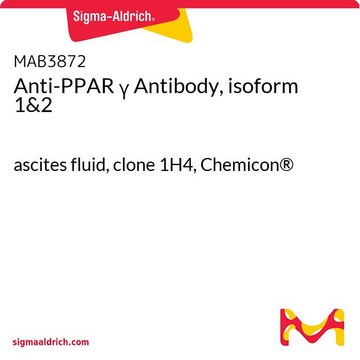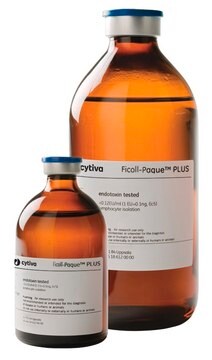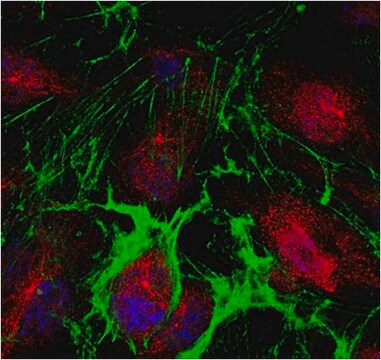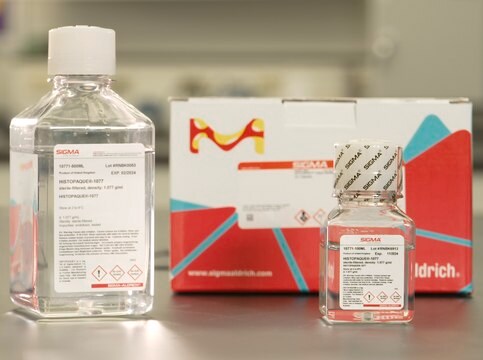推薦產品
生物源
human
重組細胞
expressed in E. coli
化驗
≥75% (SDS-PAGE)
形狀
frozen liquid
分子量
~54 kDa
包裝
pkg of 10 μg
儲存條件
avoid repeated freeze/thaw cycles
濃度
250 μg/mL
技術
electrophoretic mobility shift assay: suitable
顏色
clear colorless
NCBI登錄號
UniProt登錄號
運輸包裝
dry ice
儲存溫度
−70°C
基因資訊
human ... PPARA(5465)
生化/生理作用
There is evidence that a group of closely related nuclear receptors, called peroxisome proliferator-activated receptors (PPARs), may be involved in chronic diseases such as diabetes, obesity, artherosclerosis and cancer. The PPARs were first cloned as the nuclear receptors that mediate the effects of synthetic compounds called peroxisome proliferators on gene transcription. It soon became clear that eicosanoids and fatty acids can also regulate gene transcription through PPARs. They bind a specific element in the promoter region of target genes only as a heterodimer with the receptor for 9-cis retinoic acid, RXR (retinoid X receptor). Binding of the ligand of either receptor can activate the complex, but binding of both ligands simultaneously is more potent. Three PPAR isotypes have been identified: α, β (also called NUC1) and γ. PPAR α is expressed most in brown adipose tissue and liver, then kidney, heart and skeletal muscle. PPAR β is found in many tissues but the highest expression is in the gut, kidney and heart. PPAR γ is mainly expressed in adipose tissue, and to a lesser extent in colon, the immune system and the retina. The target genes of PPAR α are a relatively homogenous group of genes that participate in aspects of lipid catabolism such as fatty acid uptake through membranes, fatty acid binding in cells, fatty acid oxidation (in microsomes, peroxisomes and mitochondria) and lipoprotein assembly and transport.
外觀
Clear and colorless frozen liquid solution
準備報告
Use a manual defrost freezer and avoid repeated freeze-thaw cycles. While working, please keep sample on ice.
儲存類別代碼
10 - Combustible liquids
水污染物質分類(WGK)
WGK 1
閃點(°F)
Not applicable
閃點(°C)
Not applicable
S Kersten
EMBO reports, 2(4), 282-286 (2001-04-18)
Fat build-up is determined by the balance between lipogenesis and lipolysis/fatty acid oxidation. In the past few years, our understanding of the nutritional, hormonal and particularly transcriptional regulation of lipogenesis has expanded greatly. Lipogenesis is stimulated by a high carbohydrate
Peroxisome proliferator-activated receptors: nuclear control of metabolism.
B Desvergne et al.
Endocrine reviews, 20(5), 649-688 (1999-10-26)
S Kersten et al.
Nature, 405(6785), 421-424 (2000-06-06)
In developed societies, chronic diseases such as diabetes, obesity, atherosclerosis and cancer are responsible for most deaths. These ailments have complex causes involving genetic, environmental and nutritional factors. There is evidence that a group of closely related nuclear receptors, called
我們的科學家團隊在所有研究領域都有豐富的經驗,包括生命科學、材料科學、化學合成、色譜、分析等.
聯絡技術服務








